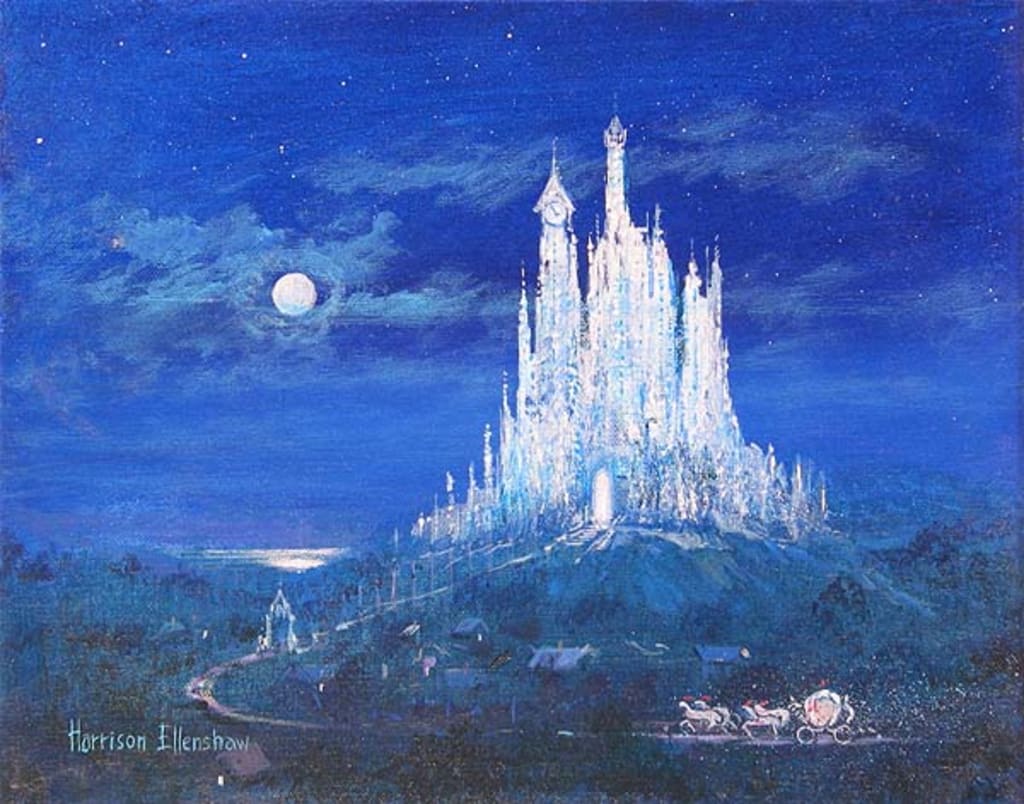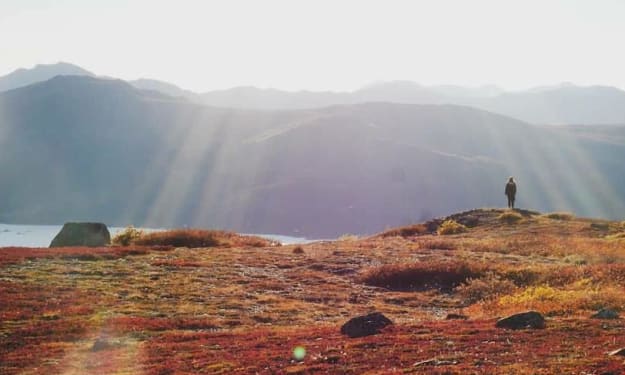My Fair Lady, Shatter These Glass Walls
Why is it old men draw lines through the earth carving out their kingdoms with their weathered bloodied hands?

Castle Walls
A stone is lightweight when it stands on its own, but when stones are built upon one another they weigh heavy on the land underneath them. Cold wet stones, inclined towards the edges of heaven, feel weightless when they’re seated on the top, staring into God’s eyes. They have no fear, even though they have so far to fall. A stone is just a piece of rock. It never meant to sit at the top of the spiral tower, but the view, oh the view, perched high on this mountain. It’s beautiful. How someone could have ever discovered this little retreat and then decide to build walls around it, no stone could understand, but they don’t care much. They get the best view when they lay in the walls of a castle.
Castles are majestic beasts as tall as a dragon, built with stones just as mighty as the dragon’s scales. Princesses gaze out of the highest tower’s window. They wave handkerchiefs to any knight brave enough to climb the antagonizing stairwell to her lair. Generals gaze upon the stone walls with blood lust. One crack of a catapult could take this section down, a battering ram over in that corner, and the weak point, yes, the weak point that will crumble the stones into powder is right there, the top of the tower. Bring that down and its weight will smash these precious walls to the ground.
Every stone built into these castle walls is a symbol for what the walls might serve or say. Status, power, wealth. Families filthy rich stake their crest onto a plot of land large enough to hold a town, with the castle at the very centre.
Besides a castle’s military purpose, they stand to differentiate those who stand inside their walls and outside their walls. The walls serve as a thick line between peasants and royalty. Stone walls do not care who stands at the top on some hierarchal list. They do not care how much paper or metal wealthy individuals may have in their pockets. They only care about the view.
London Bridge is Falling Down
London Bridge is falling down,
Falling down, falling down.
London Bridge is falling down,
My fair lady.
Build it up with stone so strong,
Stone so strong, stone so strong.
Build it up with stone so strong,
My fair lady.
Stone so strong will last so long,
Last so long, last so long,
Stone so strong will last so long,
My fair lady.
Christmas Crackers Are Not Something to Eat
Every Christmas, my family rips open cardboard Christmas crackers before we eat. Excitement and fear pulse through me. I burnt myself once when my arms pulled too hard to open it. The edges of the brown paper smoked in the sides of the cracker when it got too close to my arm. I was young and it was an experience that would always make tearing open a Christmas cracker a dangerous one.
It’s my first Christmas back from college, and it feels like nothing has changed. Just like every Christmas, we must pull apart the neat cylinder corners of the cracker. And just like every Christmas, my grandmother insists that the most unwanted part of the cracker sit on my head, a punishment in which I consider family cruelty. I refuse. She pesters me and demands I put it on with her calm tone.
“Grandma I’m 18,” I say, “I’m not gonna wear that.”
My Aunt in retaliation comes and shoves the paper crown on my head. My fingers trace the rim of the crown and consider taking it off, but my family’s eyes warn me. The crown is a deep royal purple and resembled the shape of the stereotypical crown with nine triangular points standing up high.
“See, my little princess.” My grandmother exclaims in a way that a Queen would exclaim to her daughter. In a way that says “you are a princess. All you needed was a crown.”
I fidget with the crown on my head. It itches, and when dinner is finally done and I am excused. I gladly take the monstrosity off my head. The crown is made with thin tissue paper and could be ripped at ease. It seems like a petty thing that tries too hard to be meaningful in a world that doesn’t care.
When I was a kid I used to wear these paper crowns and pretend to be a princess. I would grab a tiara and my nicest dress and march around my house trying to act as regal as the paper crown.
Perhaps all I needed to become a princess was a crown. Was this paper crown so different from the Queen of Britain’s? The idea of monarchy is but an illusion. The Queen’s blood is the same as mine. If we follow the human family tree we eventually have the same ancestors. Doesn’t that make me royalty too? Glamorous gemstones and pure solid gold sit on her head trying to be regal. Those gems and solid gold were amongst dirt once, just like those stone walls, one day they will be amongst dirt again, along with my ridiculous paper crown.
White and Red
I imagine that when I was born someone decided to stamp a maple leaf on my head and send me home with a Canadian passport and a bottle of complimentary maple syrup. I never asked to be Canadian. It’s not that I ask to have another citizenship, but it would have been nice to have a choice in the matter. I would have preferred to be Hungarian or Finnish. The amount of puns I could have made off those nationalities are endless. I sure am Hungary.
When I gaze on a spinning globe of the Earth and I wonder how someone could see those invisible lines dividing countries, and dividing people. Were they written in stone? Did some people have x-ray country vision I didn’t know about? Or were they stupid enough to think those invisible lines had always been there, and that old men weren’t creating them on charts with their own weathered and bloodied hands.
Stone Beats Scissors
In the aftermath of the Second World War, Hiroshima and Nagasaki laid in toxic waste. A result from the first and only times a nuclear bomb has been dropped on a civilian population. The cities were crumbled in devastation, surrounded by smoke, and rubble that was no longer distinguishable between stone, iron, and concrete. The few infrastructures left standing are lucky survivors: two dust riddled lone buildings in Hiroshima within the first wave of the blast radius. And the miraculous wooden Torii Gates from Nagasaki stood proud. Other structures were not so lucky. The Aioi Bridge, a T shaped three-way bridge in the heart of Hiroshima is nonexistent in the aftermath. It was the drop point for “Little Boy,” the nuclear bomb that exploded with an energy of 16 kilotons of TNT on the innocent city. The bridge didn’t know what hit it. The stones that held up its long and strange T like structure were obliterated. The stones became dust.
Stones know that all bridges fall down, just like castle walls.
War has plagued the world since the second toddler stole from the first. The piercing scream of a toddler is angry, and terrified. A castle’s cold wet stones have heard similar screams, all victims of war.
What purpose do the stone walls serve? Protection from the elements? Protection from war? Castles are fortresses. Castles are built like Goliath, with a thicker skull. Each stone has seen its fair share of war. They have experienced flamed arrows that soar into the sky, and then arch at the top of the heavens, inevitably flying back down directed at the stone armour. Stones wonder what made these humans want to fight in the first place. What made them think they were so different from one another that to fight was not to kill another brother or sister?
Was it the way humans lived? Some stones were small as pebbles, the kinds that small children pine for their fish tank. Other stones are rectangular in shape and perfect to build into a wall. Some humans lived in huts and still fished with very fine and delicate weaved nets. Other humans had mansions and used large boats to find more fish. The rectangular stone doesn’t care if it was bigger than the pebble. One day all stones will become pebbles.
The stones laugh at us, at our human stupidity. The sound is the high-pitched, swift whisper the wind makes when it flies through branches. It can just barely be heard, but it’s there in the background, it taunts. The stones know one day they will all fall down.
Citizen of Earth
My friend Melika is the epitome of Persian beauty. Dark skin, long black hair, curves that would make Sofia Vergara jealous, classic red lips, and a sly smile that springs up whenever she’s got an idea that you will certainly regret tomorrow morning. Melika wants to see the world; no, experience the world is a better way to put it. She wants to breathe in a million different breezes and smell a dozen different spices at the same time, just as I do. So we were both pretty devastated when we had to come to terms that our plan for a month-long trip to Thailand this summer wasn’t the smartest idea for broke college students. So of course, we had the most logical reaction: we sulked and watched YouTube travel videos. One of our favourites is a series of videos about The Rickshaw Run. A charity fundraiser where the subjects of these films, seven strappingly handsome Brits, hopped into three Rickshaw’s and drove across the entire width of India, over three weeks. What is a rickshaw you ask?
How to build a rickshaw:
Step 1: Acquire a tricycle or tricycle like object. (The main point of this step is to acquire three wheels and some handlebars.)
Step 2: Build a questionable hood and body for said tricycle, and coincidentally forget to build doors, so you leave a safe opening on each side that is beyond sarcastic.
Step 3: Attach a motor that will, without a doubt, break down after 10km.
Step 4: Add some seats that look quite comfortable.
Step 5: Question if it was the smartest idea to build a rickshaw.
Step 6: Agree with your subconscious that you’re already in too deep to go back now.
Step 7: Pimp out your ride.
Step 8: Find a slightly questionable, mad, and crazy driver.
Step 9: Pray to your lord, as riding in one of these may be one of the scariest things you do in your life, especially in India.
Melika and I got hooked. We imagined ourselves in their places. We drove down an Indian road, squinted our eyes into the little light the rickshaw exuded. Rain poured, and the rickshaw shook so violently from side to side whenever we hit a bump. We looked at each other; hair flew around in chaotic strands. Our eyes were alert and crazed, and we laughed. We laughed until the sun came up the next morning because what we were did was crazy. What we were did was an experience, an experience we didn’t just want in mind. An experience we didn’t just want in India. We wanted it everywhere.
How could I possibly consider myself a citizen of just one place? There were vibrant cultures steamed with life lying in wait for me. There were new delicacies my maple syrup loving taste buds could not even imagine, undiscovered waterfalls expected me to come grace with my presence, take a deep breath, and dive before my mind could tell me no. My ears awaited the stories they had yet to hear. There were a million resources that I could find at the power of my fingertips to explain what this all was like, but watching YouTube travel videos would be like the real experience.
Melika and I have dreams to travel, but her passport makes this difficult for her. Out of the 196 countries in the world, only 45 do not require Melika to have a visa. To acquire a visa may seem like a simple task to some, but any one who enters a country with an Iranian passport is put in a certain category just because of their race. It seems like everyone is afraid of what those few pages of paper in her passport will do if they enter a country. I can imagine the horror, death by paper.
I try and think of some of the names bigots may call her people, but all I can do is laugh when I imagine her as some sort of terrorist. Melika is more concerned with on how she will find another six pairs of shoes to bring on her next trip to Iran, than enacting terrorism. Isn’t her culture and race a treat we should celebrate? Not a difference we should label.
I’d like to think we aren’t those people who fired flaming arrows at stones and thought it would solve our wars. That we aren’t those people that think, yes everyone is equal, but the colour of someone’s skin makes them different from me. Yes, I’d like to think that, but I’m not naive. I can still feel the imaginary walls we put up against each other. Part of me would like to believe that we aren’t barbaric enough to cling to the idea of the “other,” just so we may put our troubles on their shoulders and turn to them when we feel like we need to have a tantrum. Yes, I’d like to think we’re not, but even today we still face these dilemmas, no matter how smaller they’ve gotten from the past.
Sad Old Men and Their Charts
When someone chooses to discriminate against another, they test human worth. Discriminators put the discriminated on a scale, just like good old stats do when they mention that white men have the highest average salary and that Hispanic women are dead last.
There must be some secret chart we all line up on that calculates our human worth. An old man with an unused croaky voice sits in a secluded corner in the heavens. His gray beard is long enough to reach the top of the desk and brush along this imaginary chart. He gains an age spot every time he writes a human’s worth. To say these spots plague him is an understatement. He used to have skin that teamed with life, but now it is old and worn.
The chart ranges from born righteousness and divine right to the useless and worthless. I’d imagine the old man might place the Royal Highness of Britain somewhere at the top, and place a poor African child from a World Vision commercial at the bottom.
This chart isn’t real. It can’t be. The man is just a figment of an explorative mind looking for an explanation to the age-old question of discrimination. An argument trying to discriminate that someone is different and therefore worthless or more is impossible. But when we “other” someone we are making them different in their worth. If I was to say someone is different than I am because they come from a different culture, then yes that’s true. That is the difference in our experiences. But if I was to “other” that person for their culture, their skin colour, or their living conditions, then I would be defining their worth. A person does not have a born worth. We all have the same blood. We all breathe the same air. We can all wear crowns and gemstones. We are all worth the same; therefore the sense of “Other” does not exist.
Shatter Me
Castle walls can’t divide us because the hierarchy of human worth doesn’t exist, or at least it shouldn’t in a modern society that’s been through its fair share of hippy phases. No one can claim a divine right to rule when there are 4,200 religions and a possible 4,200 higher beings and more that already rule the cosmos. It is believed that some of these higher beings decide your destiny, your life and your worth. Other higher beings seem not to care. Whether or not our lives are chosen for us, we all still seem to be created by our experiences. It all just depends on who chose those experiences, but either way a person’s life does not come with a price tag of human worth.
London Bridge is falling down.
These imaginary lines between countries crowns on royal heads, castle walls, and the idea of the “other” are made of glass. They are delicate ideas and concepts. They're not stone. Stone is much simpler than that. It doesn’t care about such childish ideas. It only cares when it can crumble itself down to dust then mould itself into something new. The stones know that one day, these walls will all fall down.
About the Creator
Kate McCallum
Screenwriter, Film Producer and all around Camera Nerd with a BFA in Writing & Film Studies.
Rogue Raven Productions






Comments
There are no comments for this story
Be the first to respond and start the conversation.